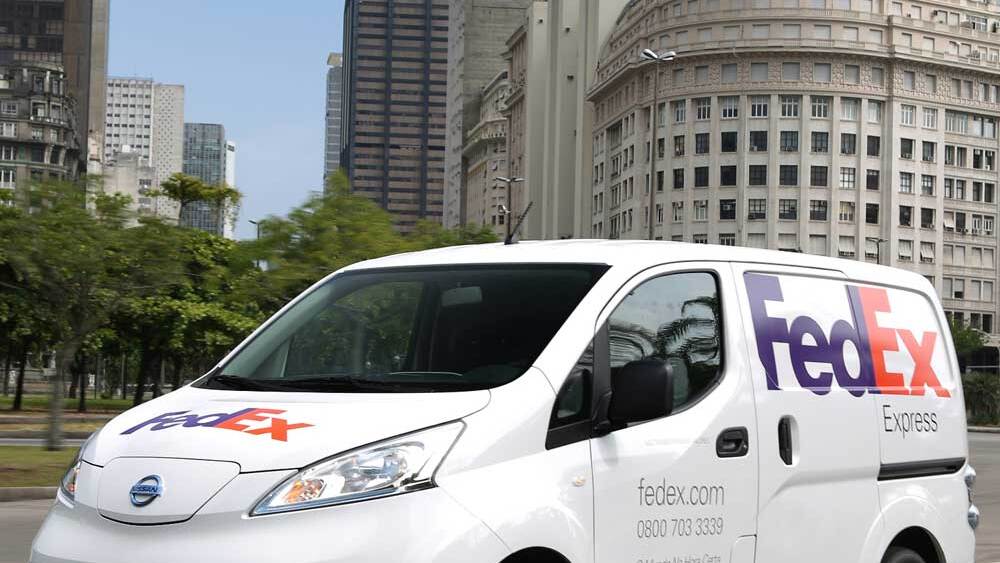- Assessment has been part of Nissan’s and FedEx joint global trial program since 2011
- As part of FedEx EarthSmart platform, the initiative explores the use of electric vehicles by the company
- The e-NV200 vans will enter mass production this year, and will be Nissan’s second globally launched electric vehicle
Miami, January 30, 2014 – In January, Nissan Motor Co., Ltd., and FedEx Express, a subsidiary of FedEx Corp. (NYSE:FDX) and the world’s largest express transportation company, will start testing the Nissan e-NV200, a 100% electric light commercial vehicle, under real conditions in Brazil. The trial is part of the vehicle’s global assessment and development program, which is being carried out jointly by the two companies. This is the first time the model will be running on the American continent. So far, the two partners have tested the e-NV200 in Japan, in the United Kingdom and Singapore and soon tests will be held in the United States.
“At FedEx, we have become a leader in the adoption and promotion of environmentally-responsible practices. This new project is a testament to our commitment not only around the globe, but also specifically in the Latin American and Caribbean region, to reduce the environmental impact of our operations,” said Juan N. Cento, regional president, Latin America and Caribbean division, FedEx Express.
Nissan is supplying FedEx Express with an e-NV200 for field tests, to be used as a delivery vehicle for approximately a month. After this period, the two companies will evaluate the model’s potential as a cargo delivery vehicle. The results found will make a significant contribution to the development of the mass production version of the e-NV200, which will start this year at Nissan’s plant in Barcelona, Spain.
Nissan’s second 100% global electric vehicle
The e-NV200 will be the second EV to be globally marketed by Nissan, after the LEAF. The compact van strengthens Nissan’s leadership in zero emission mobility and represents a major breakthrough in the commercial vehicle segment.
The 100% electric model has the same features of versatility, functionality and roominess of the base model, the NV200 compact cargo van. It also offers a unique performance thanks to a base of Nissan LEAF’s powertrain. The same lithium-ion battery powers the electric motor.
With a front-wheel drive, the e-NV200 offers an outstandingly smooth throttle and peace of mind, features that are only common to EVs. It emits no carbon dioxide whatsoever compared to approximately 140 g (.14 liters) of CO2/Km emitted by run-of-the-mill gas-propelled engines. In addition, 80% of the battery’s full capacity can be quickly recharged in 30 minutes.
The model offers a wide range of uses to different businesses, with its advanced telematics system and a power supply inside the cargo area that allows connecting external devices. The intelligent design of the battery modules ensures a larger cargo area, which is a major concern as to light commercial vehicle.
FedEx: The EV Global Fleet
FedEx currently has 167 electric vehicles and 365 hybrid electric cars in the United States, France, Germany, Italy, Japan, China and Brazil. By the end of this fiscal year (May of 2014), the company will have increased this number to 222 and 393, respectively. From 2005 to 2012, the introduction of this type of car in the fleet enabled the company to save nearly 2.4 million liters of fuel.
Initiatives like this, aligned with others, such as matching the right vehicle to the right route, buying vehicles with the right-sized engines and inclusion of light vehicles into the fleet, have allowed FedEx to quickly progress towards its goal of increasing the fuel efficiency of its fleet, which the company revised in the beginning 2013 by increasing its initial improvement target from 20 percent to 30 percent by 2020.
